algeria
6/23/2010 – USA 1, Algeria 0 – 1-0-2, 5 points, top of Group A
(via omg yanks)
When you're a sportsblogger and your fiancé is getting her PhD in a humanities field, you spend a lot of time explaining yourself. (She doesn't because a few years ago the explanation became "it seemed like a good idea at the time," which fair enough.) After the beer flew and the rage subsided against Slovenia, I was asked to explain what the hell it was with me and the USMNT, and I thought about it systematically for the first time.
My first attempt to explain was jingoistic. I like the United States and would like to root for some sort of national ideal. The Olympics are far from sufficing because they don't seem fair or competitive. Hey, we grew this Michael Phelps guy in a lab, let's see how badly he can crush humans without flippers. Etc. The national team is good, but not so good that rooting for them feels like ugly Americanism.
That was kind of right, but missing the important thing. When Dodgy At Best put out an Algeria preview, his bolded section headers read "Karma," "Revenge," "Hope," "Fortune," and "Fate." Because I am who I am mine were "stop Nadir Belhadj" and "get a lot of set pieces"; DAB got it right, and I got it wrong. I can break down a football game all day. Basketball is given over to tempo-free numbers. Baseball could be played between computers these days and no one would notice. If you are so inclined, you can delve into the details of any and reject the narratives people layer on top of them because randomness can't happen and everything must have meaning. The analysis will be better and smarter but the experience a little poorer.
Soccer defies that. It is opera on a field. Not the Italian variety where a series of humorous misunderstandings yield mildly sexy results, but German opera—Klingon opera. Plenty of tridents. Sheets of rain. Thunderbolts cascading from the sky. In the background armies march through the mud, toward each other. Patterns converge in a rumble, pressure building until it's unbearable and someone falls over, a spear jutting out from his breastplate.
I don't have any critique in me any more. Jonathan Bornstein started a World Cup game and that's fine. The US went up and down the field and didn't shut down space in the midfield and didn't finish and had everyone in bars across the country three minutes from crumpling into the sort of heap that national manias are born from. A typical example will transpire later today when Serbia tries to shake off old Yugoslav demons:
Perhaps some of the Europeans there – certainly the French journalist opposite – were driven by anti-German feeling, perhaps some were instinctive Slavophiles, but when the three locals at the MTN (South Africa-based mobile telecommunications company) desk reacted to the final whistle with a group hug and collective dance, the appeal of Serbia's inner turmoil becomes difficult to deny. Unless they'd had a bet, I suppose, but when asked one said he'd decided to support Serbia because "they seemed to be trying to lose".
English journalist Simon Kuper dedicated a good chunk of his most recent book to explaining the English fatalism towards their team, one that echoes the national narrative of empire lost. It's so cliché that multiple books have been written about it, including Kuper's earlier, excellent "Football against the Enemy," but it's true: soccer does reflect the national culture, mostly because people want it to and no one can stop its narrative by dissecting it.
The USA's narrative has been bootstraps. College kids rescuing the program, batty goalies with an American flag fetish, Paul Caliguri, and so on. Tom Friend just published a lengthy story on USA 1990 third-string goalie David Vanole that's veritably dripping with half-truths dedicated to shaping that narrative. The USMNT is the 1980 hockey team spread over twenty years, because that's the way we want it.
We don't roll around on the ground. If we fall over, we probably just fell over. We run and and run and run, and late, when everything is stacked against us in a game where it's just so hard to finish the job, we do it Puritan style: ugly effort. A minute into stoppage time, the ball's just lying there and it's all about who will get there first.
It takes some doing to unearth muppets in June but here they are:
And you can't have one without the other…
That was horrible, as if Ryan Miller was actually Algeria and FIFA and the universe and God. And then the ball was just lying there, waiting to be pushed in one direction or the other.
USA vs Algeria: Wednesday 9:30 AM , ESPN.
But don't tell them that because they'll cut you.
The Situation
Brady2Terrell has a clear and comprehensive breakdown of what the US needs in a message board post. To make it even more concise: a win means the US is in. A loss means the US is out. A draw and the US is waiting on the result of the other match. In that case, England winning puts us out. Basically anything else and the US is through. Draws in which England scores three more goals than the US does—very unlikely—put England through instead. Draws in which England scores two more lead to a decision based on card accumulation, in which the sides are tied.
Those things are maybe 1% probable. Slovenia goes through with a draw and is very experienced at bunkering; England's offense has been impotent thus far in the tourney.
Ignoring that, your rooting interests:
- Win
- Do not lose
- If tie, hope England does not win.
Since both games will happen at the same time this promises many tense moments unless the US goes up two (raise your hand if you think that's likely, and if you've raised your hand please relocate yourself to a national team that apparently does not exist). Wednesday will be knee-buckling.
The Opponent
Algeria is a strange team. Every time Nadir Belhadj (above) makes a darting run forward I am literally angry that Algeria can pump out a left back like that and we're left with Jonathan Bornstein and a centerback gamely playing out of position. Rangers manly-man Madjid Bougherra would probably be the USA's first-choice centerback with Onyewu's injury and lack of form. Abdelkader Ghezzal may not score a lot in Serie A, but he's actually in Serie A. Serie A would laugh at the entire US forward corps, then consider them again just to laugh some more. If you were to pick a starting eleven from the combined rosters of the same team, the position at which Algeria would win they would win by a country mile.
But… that's kind of it as far as obvious Algeria wins goes. Their goalkeeper, described as "very, very dodgy" by Zonal Marking even before the tournament started, was replaced after giving up a game-winning goal to Slovenia that was almost but not quite as bad as Robert Green's nation-horrifying mistake. His replacement got his first international start against England, making a couple of good saves while looking equally dodgy on balls played in from the edges. He plays in the Bulgarian league. Knock on wood, but the chances he gives up a game-changing mistake are much greater than Tim Howard's.
Tactically, Algeria is extremely variable. They shifted from a three-man backline in the African Cup of Nations to a 4-4-2 in their pre-WC friendlies, then went with a 3-5-2 that was closer to a five-man backline against England.
With Ghezzal available—he was suspended for the England match after picking up two yellows in just over twenty minutes as a second half sub against Slovenia—and Algeria needing to win by two goals to guarantee advancement, the Desert Foxes will probably adopt a more attacking posture against the US. This will see Nader Yahia move back to right back after being drawn inside to play centrally against England, with the rest of the midfield adopting more aggressive attacking positions.
Left: Algeria (white) against Slovenia. Right: Algeria (green) against England. While the England formation looks more aggressive, in reality the two wing-backs operated mostly as defenders.
The two central midfielders were described by Zonal Marking as "simple defensive-minded midfielders" before the tournament and have lived up to that reputation. What attacking the Algerians manage is usually through Belhadj and Wolfsburg attacking midfielder Karim Ziani, easily recognizable as the douchiest looking guy in the tournament thanks to his blond dye-job. (Algeria, as a group, look like Aqua.)
The attack broke down in the final third against England when Matmour, normally a midfielder, provided no threat:
Algeria dominated possession for periods of the game, as you would expect for a side essentially fielding six midfielders. Indeed, you can stretch that to seven – because Matmour is plainly not a forward, let alone a lone striker. His movement was decent but he offered no threat in behind, which is the obvious way to catch out a defensive partnership of John Terry and Jamie Carragher.
Threats in behind are also an obvious way to catch out the defensive partnership of DeMerit and Onyewu, so it's nice that Algeria doesn't have a consistent way to generate any. Ghezzal is a strapping 6'1" guy who shouldn't be a huge matchup problem for Onyewu and Demerit.
ZM sums up their first two games as "dogged" but says they've "offered nothing in an attacking sense" thus far. Whether that will hold true against a leaky USA defense is another section.
The Us
The Nats are in an unusual and advantageous situation. Algeria has a shot to advance but absolutely must win. They will be forced to attack against a team they might have bunkered against if they'd faced them in one of the first two group matches. This should play into the USMNT's hands. They're an excellent counter-attacking team even against world class sides like Spain and Brazil, and Algeria's defense has a tendency towards Michigan 2009 errors. Marauding fullbacks and erratic passing will yield plenty of opportunities for the US to strike back.
So… this is a situation in which a ball-winning central midfielder next to Bradley is a priority. I haven't been a fan of Clark, but Edu's second-half performance against Slovenia wasn't much more impressive. Either would be fine as a starter; Torres is set to be a second-half sub if the US needs a goal.
As far as the forwards go, take your pick between putting Buddle in the starting lineup and thrusting Dempsey up top and putting Holden into the fray. With Algeria's games to date proving Belhadj the Algerians' most effective attacker, I vote Holden plus Dempsey. Holden is a young, pacey, work-rate-heavy winger capable of tracking Belhadj's runs better than Dempsey, and tasking Holden with the most important defensive responsibilities frees Donovan to be Donovan*. Holden is the only US player who gives the team any width, and his ability to get deep and cross should be an effective way to test any of Algeria's flappy goalkeepers.
The seemingly odd substitution of England winger Aaron Lennon (generally regarded as by far their best wide option) for national whipping-boy Shawn Wright-Phillips was because Lennon kept cutting inside:
Aaron Lennon constantly came inside rather than getting down the touchline. He needed to be braver and give Nadir Belhadj more of a problem by staying wide and high when Algeria got the ball – this would have either pushed Belhadj backwards to pick up Lennon, and therefore take him out of the equation, or forced one of the three centre-backs to come across to the left-back position, which would have removed Algeria’s luxury of a free man at the back.
Tracking Belhadj and threatening him with an actual winger will go a long way towards shutting down the Algerians' main attacking threat. This could be a game where Beasley makes sense as a second-half sub, possibly for a ragged Holden.
The United State has another huge advantage in the game: set pieces. The US was consistently dangerous on them in the first two games because of Landon Donovan's excellent service, and Algeria was often disorganized in their first two games. It's easy to envision the US pumping in a goal or two from dead-ball situations, another reason to focus on wide play—and the resulting corners that come from it.
(SIDE NOTE: why has Donovan been so excellent in a tournament in which every well-hit cross sees four or five fly wildly out of control? One: he's good. Two: MLS is our secret weapon. Many observers are convinced that a lot of the crappy play in this World Cup (goalie errors, wack crosses, zero free-kick goals) stems from the Jabulani ball, and that the Germans' proficiency with it is traceable to the Bundesliga's adoption of the thing six months ago. Guess who else is using it?
On a domestic front, the Jabulani has made an appearance in Portugal’s league, Argentina’s league, America’s MLS, the Dutch league, the French Cup and the Swiss league.
So there you go.)
As long as the game remains tied, the advantage is to the US. With the sketchy central defense and the situation they can adopt their usual slightly defensive 4-2-2-2 and wait for the opportunities that will surely come.
Projected 11
G: Howard.
D: Cherundolo, Onyewu, Demerit, Bocanegra
M: Donovan, Clark, Bradley, Holden
F: Altidore, Dempsey
*("Landycakes" is dead. You hear me? Dead.)
The Important Thing
Do not go down a goal in the first fifteen minutes. Algeria probably couldn't go in a shell at that point—they need to win by two to guarantee they go through—but they would pull back somewhat, waiting for information from the Slovenia-England game. The longer Algeria's kept off the board, the more they'll have to press and the more vulnerable they'll be.
This section is totally obvious and useless, I know.
Some other important things:
- Play wide and quickly to exploit the space left by the attacking Algeria fullbacks.
- If Dempsey is up front consider dropping back into a 4-5-1 that would give Donovan and Holden more license to press high, potentially taking Belhadj and others out of the offense.
- Keep the wing players outside and allow Demerit and Onyewu to do what they do best: clear crosses.
- Pick up as many set pieces as possible.
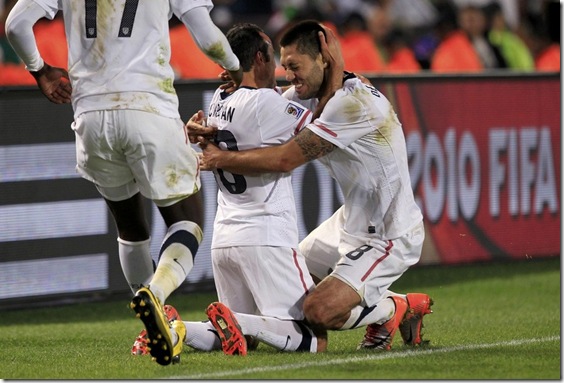
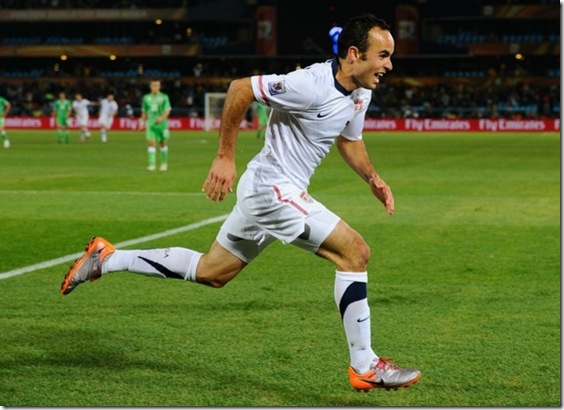
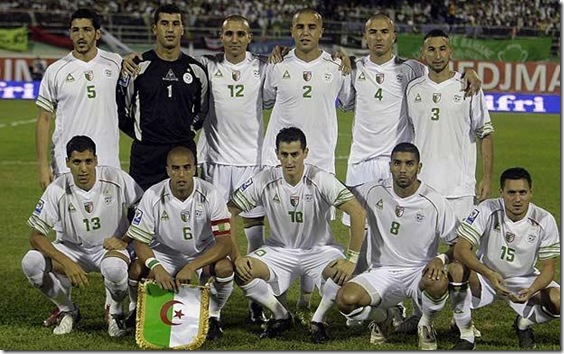
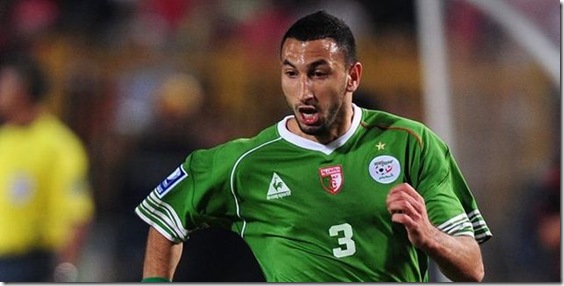
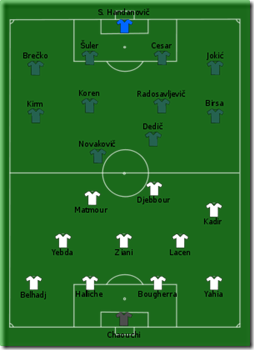
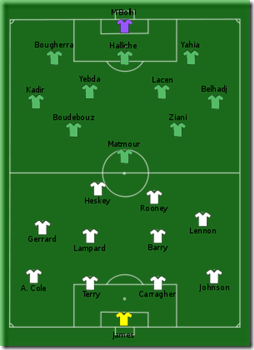
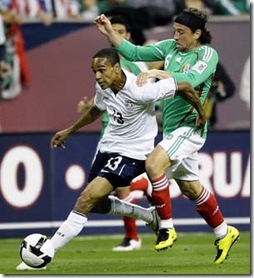
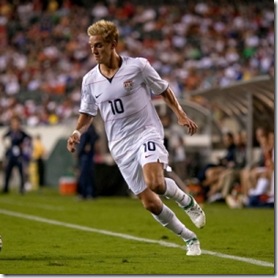
68